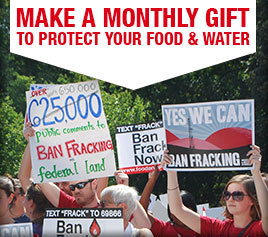- About
- Take Action
- Issues
- Food
- Water
- Common Resources
- ALL ISSUES
- Antibiotics
- Bottled Water
- Climate Change
- Consumer Labels
- Desalination
- Factory Farms
- Food & Water Justice
- Food Safety
- Fracking
- Genetically Modified Foods
- Global
- Irradiation
- Nanotechnology
- Radiation Impacts
- Public Water Infrastructure
- Trade
- Water Privatization
- World Water
- Research
- Tools & Resources
- News & Blog
- DONATE
Water
Fracking
Some energy analysts are predicting that natural gas will be the fuel of the future if advances in drilling technology allow drillers to tap into domestic shale rock formations on a large scale. But because of the impacts that the technology can have on water, natural gas could become our next energy disaster.
Water Privatization
Communities that have experimented with privatization have found that it does not solve their water woes. In fact, many private companies are providing worse service at a higher cost than most public utilities.
Take Back the Tap
Residents, students, activists, and communities across the country want to kick the bottled water habit and protect their access to clean, safe, affordable water. Get inspiration from college campuses and find out what you can do to Take Back the Tap.
Bottled Water
Not only is bottled water not safer than tap water and way more expensive, it also creates mountains of garbage. Bottled water companies also mislead communities into giving away their public water in exchange for dangerous jobs. And with declining bottled water sales in the US, people in developing countries are being targeted to make up for lost revenue.
Desalination
As cities face increasing water management problems, some companies and elected officials are pushing an expensive, energy-intensive technology called ocean water desalination. Desalination separates salt from seawater. It might sound like a good idea, but this technology’s hazards far outweigh its potential benefits.
Triclosan
There may be dangerous chemicals in your everyday household products that persist in the environment, mix with other chemicals to form more toxic chemicals, contribute to the growing problem of bacterial resistance to antibiotics, and causes a range of human health problems.
Water Conservation
Make the most of the water you use in your home. Consider taking shorter showers. Invest in a low–flow toilet or put a plastic bottle filled with water in your toilet tank to reduce the amount of water used per flush. Turn off the tap while brushing teeth or shaving.
World Water
According to the World Health Organization, an estimated 1.7 billion people still lack access to clean water. 2.3 billion people suffer from water-borne diseases each year. While the demand for water is on the rise, the supply is shrinking. Water-intensive agriculture, population growth, industrial pollution, breakneck development and other ecological threats are depleting freshwater supplies.










